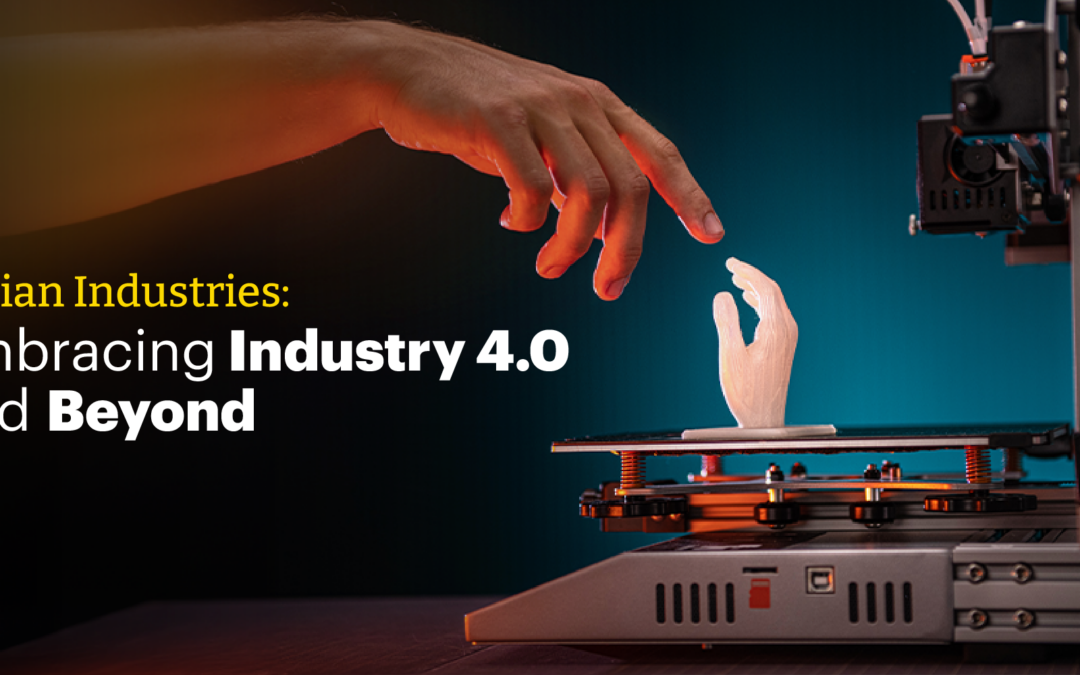In the larger tapestry of technological progress, there emerge pivotal moments that serve as catalysts for profound transformation. We now stand at the cusp of one such milestone: the widespread adoption of 5G technology in India. The convergence of 5G and Industry 4.0 has the potential to revolutionize various sectors and drive economic growth. Prime Minister Narendra Modi, in his distinguished capacity, inaugurated this groundbreaking service last year at the India Mobile Congress, underscoring India’s poised leadership in the industry 4.0 revolution, with 5G steering the course. Through his remarks, esteemed experts, in their research proposed that by the year 2035, the ripple effect of 5G technology will culminate in a whopping economic impact of $US 1 Trillion. Between the years 2025 and 2040, it is anticipated that this technological leap could result in an additional GDP boost of US$150 billion for the nation. This outlook seamlessly details India’s vision of becoming a US$ 5 Trillion economy by the year 2025.
The Dawn of 5G: A Game-Changer for Indian Industry 4.0
As Industry 4.0 continues to redefine the landscape of manufacturing and production, the integration of 5G technology will undoubtedly be the backbone of this transformation. 5G’s unparalleled speed, ultra-low latency, and massive device connectivity capabilities will serve as the bedrock upon which a new era of smart, connected industries will be built. A recent report from Ericsson looked at how satisfied people are with their 5G networks and why they stick with them. They found that in India, about 31 million people might switch to 5G phones in 2023, which is a big chance for 5G to grow. The report also highlighted that people in India who use 5G are really into using apps like streaming videos, video calls, games, and augmented reality. They spend about two hours more per week on these activities compared to people in other countries with 5G.
Let’s explore how the implementation of 5G services will enhance Industry 4.0.
1. Hyperconnectivity and the Internet of Things (IoT)
With 5G, the Internet of Things will soar to new heights. The ability to connect a multitude of devices in real time will revolutionize how industries operate. From predictive maintenance to autonomous logistics, the potential applications are boundless. In the contemporary industrial landscape, factories are undergoing a transformative technological evolution. Despite the integration of cutting-edge machinery to enhance efficiency and automation, they persist in utilizing outdated ethernet cables for crucial data transmission. The full potential of these machines could be harnessed by connecting them to and overseeing their operations through dependable wireless networks. This connectivity will not only enhance operational efficiency but also lead to more informed decision-making, driving innovation and competitiveness.
2. AI and Machine Learning Integration
The true power of Industry 4.0 lies in the convergence of artificial intelligence and advanced analytics. With 5G’s high-speed, low-latency communication, the processing of vast amounts of data in real time becomes a reality. This will enable machines to learn, adapt, and make decisions at an unprecedented pace, thereby ushering in an era of cognitive automation and intelligent manufacturing. During the Prime Minister’s fifth webinar on the budget earlier this year, centered around the theme of “leveraging technology for enhanced quality of life,” he emphasized its pivotal role in India’s trajectory towards achieving developed nation status by 2047. The Prime Minister affirmed that technology would not only enhance the overall quality of life but also play a crucial role in employment generation.
3. Immersive Technologies: AR and VR
The integration of Augmented Reality (AR) and Virtual Reality (VR) into industrial processes will become seamless with 5G. This will revolutionize training, maintenance, and remote collaboration. Imagine engineers troubleshooting a piece of machinery in real-time through AR, or designers collaborating on a virtual prototype from different corners of the globe. This level of immersion will redefine what is possible in Industry 4.0.
4. 5G Use Cases for Consumers
5G differs from 4G in its ability to offer incredibly high internet speeds. This enables users to swiftly download large files, enjoy seamless 4K video streaming, and engage in lag-free, high-definition gaming experiences. Even in densely populated areas like stadiums or concert venues, 5G ensures uninterrupted streaming for its consumers. It is imperative to understand that Its impact on various industries is substantial, but 5G’s application particularly stands out in the healthcare industry. With 5G, real-time monitoring of patients’ vital signs and health conditions becomes possible, allowing for prompt interventions and reducing the need for frequent hospital visits. Additionally, the provision of high-quality video consultations empowers healthcare professionals to offer remote advice, a crucial capability during emergencies or for patients residing in remote areas.
A Vision for India: Pioneering the 5G-Driven Industrial Revolution
India, with its vibrant entrepreneurial spirit and a burgeoning tech ecosystem, is uniquely positioned to lead in the convergence of 5G and Industry 4.0. Let us look at how this will augment:
1. Investment in Infrastructure
Ensuring widespread 5G coverage across the nation is paramount. Collaborative efforts between the public and private sectors must be prioritized to build a robust and inclusive 5G infrastructure that reaches every corner of India.
2. Empowering a Skilled Workforce
The transition to Industry 4.0 demands a skilled workforce proficient in the latest technologies. Investment in training and upskilling programs will be instrumental in preparing our workforce for the jobs of tomorrow.
3. Fostering Innovation Ecosystems
Encouraging startups and fostering innovation ecosystems will be pivotal in harnessing the full potential of 5G. Incubators, accelerators, and collaborative platforms must be established to support entrepreneurs in developing solutions that leverage 5G technology.
5G is not merely a technological advancement; it is an enabler of a future where industries operate smarter, faster, and more sustainable. It is imperative to seize this moment and guide India towards a future where Industry 4.0 becomes synonymous with progress, innovation, and prosperity.


Recent Comments